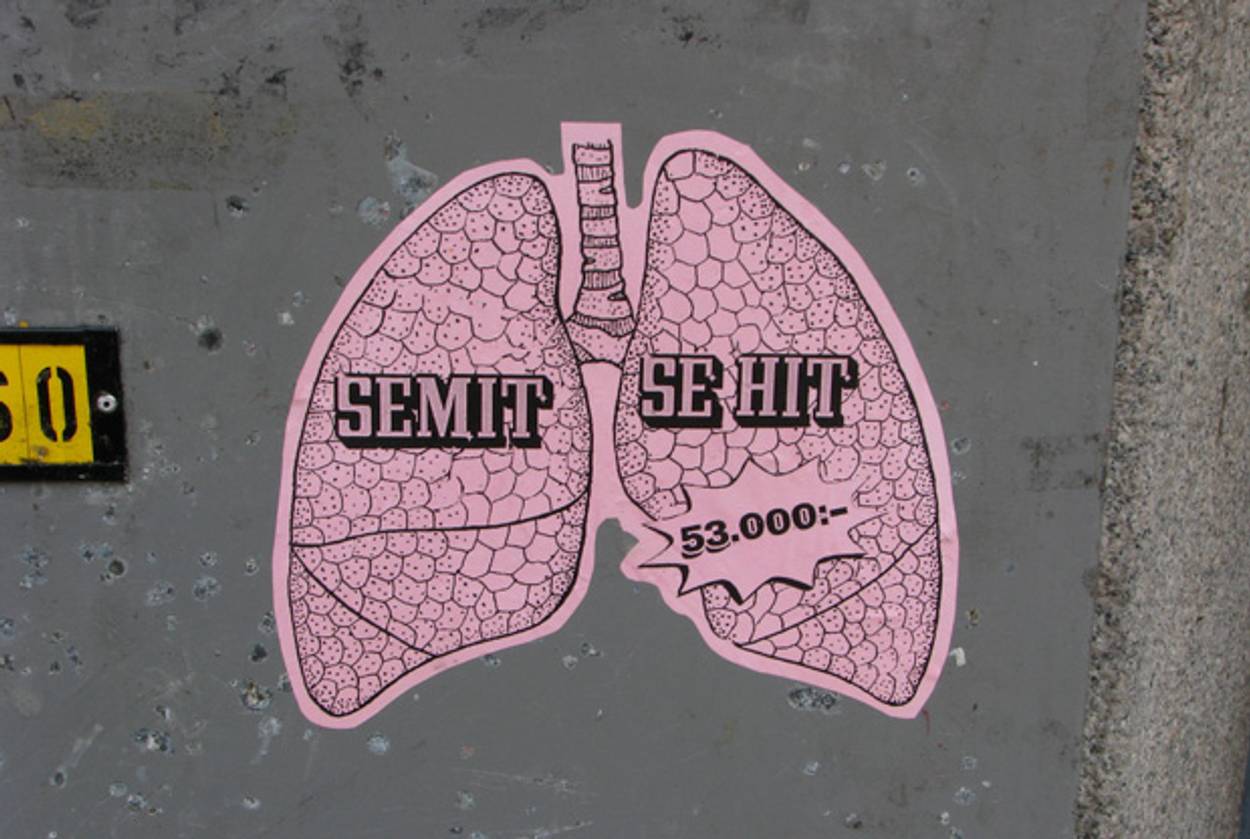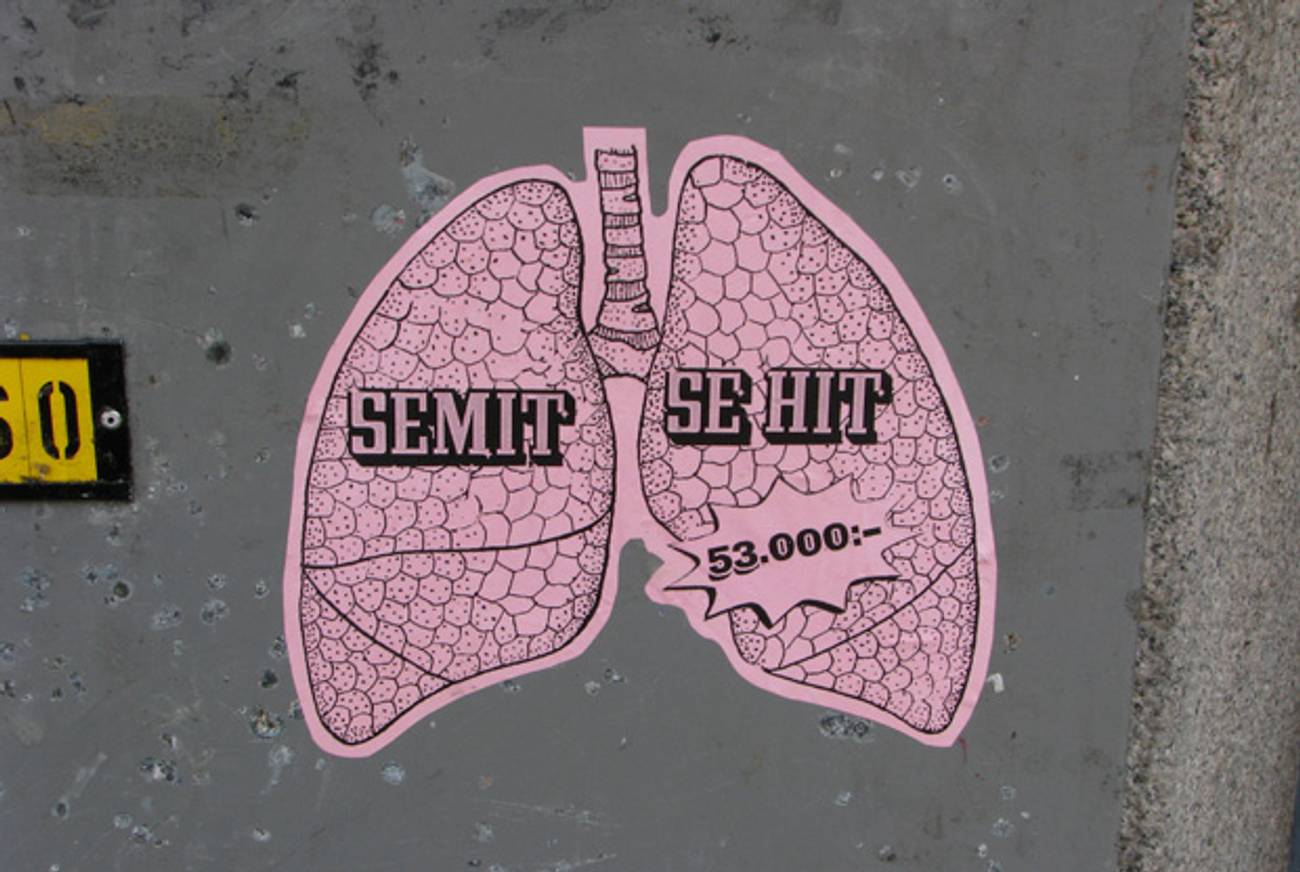The Blood Libel That Won’t Quit
In Sweden, a respected magazine is reviving the canard that the IDF plundered the organs of Palestinians




In 2009, the Swedish tabloid Aftonbladet ran a story alleging that members of the Israel Defense Forces had stolen the organs of up to 69 Palestinians who died in their custody. Titled “Our sons are plundered of their organs” it accused the IDF of having conducted “macabre operations” in the Occupied Territories during the early 1990s. The story also suggested that the International Court of Justice should investigate Palestinian families’ claims that their sons were being captured and tortured by the IDF, subjected to involuntary autopsies, and then “robbed of their organs before being killed.”
The article sparked a diplomatic crisis. Israel’s Foreign Ministry spokesperson Yigal Palmor called it “a mark of disgrace” for the Swedish press and Prime Minister Bejamamin Netanyahu demanded that the Swedish government condemn the newspaper. Since the article was published, it has cropped up frequently on anti-Semitic forums in Sweden and beyond, held up as evidence that the Jewish state sanctions organ theft. And Aftonbladet’s reputation was sullied after it came under heavy criticism from the rest of the Swedish media.
Now the respected Swedish culture and news magazine Filter has revived the controversy by weighing in on the debate, dedicating 17 pages in its most recent issue to a story purporting to vindicate the author of the Aftonbladet story, reporter Donald Boström, and his editor, Åsa Linderborg. In response, Linderborg and her colleagues have declared victory, publishing triumphant editorials scolding the Swedish press corps for its “betrayal” and arguing that Boström’s story helped put a stop to illegal organ trading in Israel.
But in fact, the Filter magazine story, despite its length, does not provide any new evidence to substantiate the libelous claims about the IDF—and brushes over the widespread accusation that Aftonbladet peddled a conspiracy theory. Instead, the article offers a detailed account of Boström’s 1992 trip to the Middle East, of the firestorm that followed the publication of his article, and of how Boström was affected personally. The piece blames the critics for that firestorm, asserting simply that readers “cried anti-Semitism a bit too soon.”
Linderborg, who was appointed culture editor of Aftonbladet in May 2009, two months before publishing Boström’s article, takes the same view, dismissing criticism that the story mirrored classic anti-Semitic tropes and conspiracy theories as entirely unfounded. “There is this pattern in Sweden,” she explained to me. “If you criticize Israel’s actions towards Palestine you are labeled as an anti-Semite … and that is why many journalists here keep quiet on this issue.”
Critics across the political spectrum, however, insist that the Aftonbladet story was irresponsible journalism at best, and, at worst, baldly anti-Semitic. “It is absolutely not anti-Semitic in itself to present accusations about Israel,” Jonathan Leman, a reporter for anti-racist magazine Expo, said. “But it so happens that these ideas about global networks of Jews and of organ plundering very closely match classic, medieval anti-Semitic accusations that can also be found in racist and right-wing forums today. And so if you move in that territory you have to be aware of this and be aware that your story can be misused by intolerant people. And that is, in fact, precisely what has happened. But it’s as if Linderborg and Boström are unwilling even to entertain that thought.”
***
Boström’s 2009 story began with a meaningless connection between two events two decades apart. It drew links between what was then a newly exposed organ trafficking ring in New Jersey run by a Brooklyn rabbi named Levy Izhak Rosenbaum who brokered the sale of black-market kidneys (buying them from Israel and selling them to U.S. patients) and Israel’s low organ donations rates in the 1990s. This was also the same time period during which Boström met Palestinians in the West Bank who told him they suspected that young men who had been captured by Israeli soldiers had had their organs removed before being killed. “Young Palestinian men were disappearing and delivered back to their villages at night five days later, dead, their bodies ripped open,” wrote Boström.
In Jerusalem, Boström encountered U.N. employees who told him that West Bank Palestinians had raised suspicions that young men had been “captured” by Israeli soldiers in their villages and had “involuntarily acted as organ reserves before being killed.” These suspicions, he wrote, “warrant an investigation by the International Court of Justice to find out whether this is a case of Israeli war crimes.”
The Filter story argues that critics are to blame for reading the Aftonbladet article sloppily. It says it was written “in a sweeping style, with lots of loose ends that the reader had to tie together. And when they themselves tied those ends together they read that Donald Boström claimed that there was an international Jewish conspiracy which involved the government, the Israeli army and organ traders. They read that the IDF consciously killed Palestinians to use them as involuntary organ donors.” In other words, it was all just a misunderstanding. Readers jumped to conclusions likely because they were biased.
“I wanted to include all the material I had to make people feel like: OK, he knows what he’s talking about, he’s spoken to people on both sides, he’s gone through the material,” Boström told me, defending himself. But in fact, he had completely missed the most crucial aspect of the story: The U.N. employees that Boström met had asked him to photograph the body of 19-year-old Bilal Achmed Ghanan, a “stone thrower” who had been shot by IDF soldiers and taken to the Abu Kabir Institute of Forensic Medicine in Israel. One of these photos, showing Ghanan’s sewn-up body, illustrated the Aftonbladet article. But what the gory photo actually showed was something quite different than Boström reported.
Nearly a decade before Boström and Aftonbladet saw the New Jersey organ trafficking ring as an opportunity to accuse Israel of organ trafficking, the Israeli daily Yediot Ahronot had published an exposé about Abu Kabir and its chief pathologist, Yehuda Hiss, who during the 1990s had indeed removed organs and tissues from bodies for years without consent, replacing them with toilet paper rolls and metallic rods to hide the thefts. An inquiry ordered by the Israeli state in 2001 had also confirmed these findings. Hiss and his staff had been indiscriminate about organs, taking thousands of body parts from 125 individuals including Israeli soldiers, Palestinians, guest workers and tourists. In an interview with Israel’s Channel 2, Hiss spoke openly about the organ thefts.
It seems Boström was either entirely unaware of the Hiss scandal, which had made international headlines, or chose to ignore it.
Ronen Bergman, one of the reporters behind the Yediot Ahronot exposé, told Swedish Radio over the weekend that he was “shocked” to read Aftonbladet’s story, which, he said, had “distorted and falsified” the findings of his decade-old scoop by suggesting that the IDF was targeting Palestinians in order to supply their bodies to Abu Kabir. “What I discovered is that the forensic institute was stealing organs from everybody … the only criteria was if the bodies were fresh enough and if the staff would be able to hide the organs without being caught.” The IDF was not involved in any way.
Linderborg now emphasizes that both Palestinians and Israels were victims at Abu Kabir and that the Palestinian men “were not killed because Israel needed organs but they were killed in a conflict with Israel and one took the opportunity to take their organs.” But that’s a very different version of events from the original story, which suggested Palestinian men were “captured” by soldiers and acted as Israel’s “organ reserve” at a time when the country was struggling to convince its population to sign up for voluntary donations.
The truth about Israel’s organ-trafficking scandal—that a rogue pathologist and his staff carried out a grotesque crime and were indiscriminate about their victims—is certainly not the message readers received. “When Aftonbladet, a big Swedish newspaper, publishes a text like this it carries a certain weight and that is why it is constantly referenced,” Leman, the Expo journalist, told me. “For instance it was cited by those who claimed that Israeli relief efforts in Haiti after the earthquake were a smokescreen for organ theft operations.”
Linderborg doesn’t see things that way. “Palestinian mothers have had their sons killed, these sons were dragged over the border from the West Bank and into Israel, they ended up at Abu Kabir, their bodies were ripped open and actually, actually emptied of organs,” she told me. “However you twist and turn [Boström’s] article and the Israel-Palestine conflict, in the end it’s about one and the same issue and that is that Palestinians are being killed by Israel in a 60-year-old conflict.”
Nathalie Rothschild is a writer based in Stockholm, Sweden.